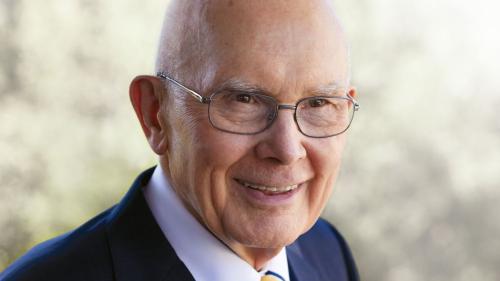In coming elections and at all times, we ought to communicate with kindness, maintain hope for the future, and defend religious freedom.
Elder Dallin H. Oaks, a member of the Quorum of the Twelve Apostles of The Church of Jesus Christ of Latter-day Saints, delivered this devotional address on September 13, 2016. This is the complete unedited address.
Summary
"Some years ago President Thomas S. Monson gave this valuable counsel: 'My brothers and sisters, today, as we look at the world around us, we are faced with problems which are serious and of great concern to us. My counsel for all of us is to look to the lighthouse of the Lord. There is no fog so dense, no night so dark, no gale so strong, no mariner so lost but what its beacon light can rescue. It beckons through the storms of life. The lighthouse of the Lord sends forth signals readily recognized and never failing.'
"Those words comfort me as I view the terrible conflicts in today’s world and the extreme moral and policy divisions that separate different citizens and different aspiring leaders. We all should rely on this assurance in modern revelation: 'Fear not, little flock; do good; let earth and hell combine against you, for if ye are built upon my rock, they cannot prevail' (D&C 6:34).
"I believe religious freedom is declining because faith in God and the pursuit of God-centered religion is declining—worldwide. If one does not value religion, one usually does not put a high value on religious freedom. It is looked at as just another human right, competing with other human rights when it seems to collide with them. I believe the freedoms of speech and assembly are also weakening because many influential persons see them as colliding with competing values now deemed more important. Some extremists have even opposed free speech as an obstacle to achieving their policy goals.
"Some of you are wondering whether I will speak of how my concerns for freedom in higher education apply to BYU. I have obviously pondered deeply on that subject, especially during the nineteen years of my service in important positions of academic leadership, first at the University of Chicago and then at BYU. The similarities between those two great universities are far larger than their differences, but there are differences, which I will describe.
The differences are rooted in BYU’s unique religious mission and the method of learning inherent in it. As stated in BYU’s official policy on academic freedom, dated more than twenty-three years ago, 'The BYU community embraces traditional freedoms of study, inquiry, and debate, together with the special responsibilities implicit in the university’s religious mission.' Those special responsibilities include some limits on academic freedom. Limitations are common to all universities, as the Chicago report conceded, but BYU’s limitations are express and well publicized.
BYU’s policy concludes with this important affirmation:
'For those who embrace the gospel, BYU offers a far richer and more complete kind of academic freedom than is possible in secular universities because to seek knowledge in the light of revealed truth [and I would add by the methods of revealed truth] is, for believers, to be free indeed.'
And so I have spoken of elections, hope, and freedom. In these distressing times our freedom and hope can best be fostered by five actions:
- We must concentrate on what we have in common with our neighbors and fellow citizens.
- We must strive for mutual understanding and treat all with goodwill.
- We must exercise patience.
- We should all speak out for religion and the importance of religious freedom.
- We must, above all, trust in God and His promises."
—Elder Dallin H. Oaks
Full Speech
https://speeches.byu.edu/talks/dallin-h-oaks/elections-hope-freedom/


